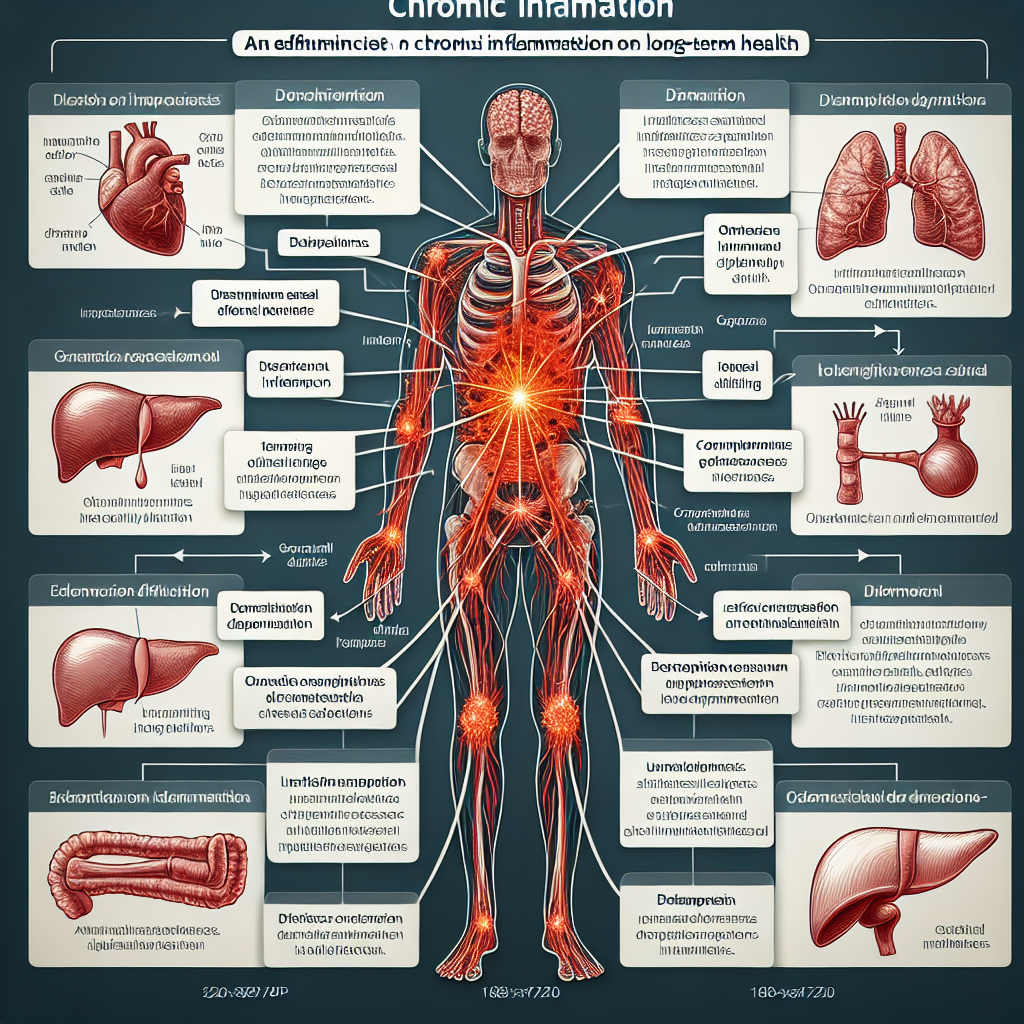The Impact of Chronic Inflammation on Long-Term Health

Discover more about the impact of chronic inflammation on long-term health. Understand the risks, learn about prevention strategies, and take control of your health today. Visit www.myvibrantvitality.com now.
Understanding the Link Between Chronic Inflammation and Long-Term Health Issues
Chronic inflammation, a prolonged and persistent form of inflammation, has been identified as a significant contributor to various long-term health issues. This condition, often silent and unnoticed, can persist for months or even years, causing a gradual but significant impact on our overall health. Understanding the link between chronic inflammation and long-term health issues is crucial in promoting wellness and preventing disease.
Inflammation is a natural response of our immune system to injury or infection. It is a protective mechanism that helps the body heal by increasing blood flow to the affected area, recruiting immune cells to eliminate pathogens, and promoting tissue repair. However, when inflammation becomes chronic, it can turn against the body, leading to a host of health problems.
Chronic inflammation is often associated with various lifestyle factors such as poor diet, lack of exercise, stress, and exposure to environmental toxins. These factors can trigger an inflammatory response that, over time, becomes chronic. The body, in a constant state of alert, produces inflammatory substances that can damage healthy cells and tissues, leading to disease.
One of the most significant impacts of chronic inflammation is its role in the development of chronic diseases. Research has shown that chronic inflammation is a common denominator in many long-term health issues such as heart disease, diabetes, cancer, and neurodegenerative diseases like Alzheimer’s. For instance, in heart disease, chronic inflammation can lead to the buildup of plaque in the arteries, a condition known as atherosclerosis. This can result in heart attacks or strokes. Similarly, in diabetes, chronic inflammation can lead to insulin resistance, a key factor in the development of type 2 diabetes.
Moreover, chronic inflammation has been linked to the aging process. Inflammation can accelerate cellular aging by causing DNA damage and disrupting normal cell function. This can lead to premature aging and increase the risk of age-related diseases.
Furthermore, chronic inflammation can impact mental health. Studies have found a connection between chronic inflammation and mental health disorders such as depression and anxiety. Inflammatory substances can affect brain function, leading to changes in mood and behavior.
Despite the potential harm, chronic inflammation is not always easy to detect. It often presents no noticeable symptoms until significant damage has been done. Therefore, it is essential to adopt a proactive approach to manage and prevent chronic inflammation. This includes maintaining a healthy lifestyle with a balanced diet, regular exercise, stress management, and avoiding exposure to environmental toxins.
In conclusion, chronic inflammation is a silent but potent threat to long-term health. It plays a significant role in the development of chronic diseases, accelerates the aging process, and can impact mental health. By understanding the link between chronic inflammation and long-term health issues, we can take steps to manage and prevent this condition, promoting overall wellness and longevity.
The Role of Chronic Inflammation in the Development of Chronic Diseases

Chronic inflammation, a prolonged and persistent form of inflammation, has been identified as a significant contributor to the development of various chronic diseases. This silent and often overlooked condition can have a profound impact on long-term health, leading to a myriad of health complications if left unchecked.
Inflammation is a natural response of the body’s immune system to injury or infection. It is a protective mechanism that helps the body heal by increasing blood flow to the affected area and recruiting immune cells to combat foreign invaders. However, when inflammation persists beyond the acute phase, it becomes chronic, leading to a state of constant alert that can wreak havoc on the body’s tissues and organs.
Chronic inflammation is now recognized as a key player in the pathogenesis of many chronic diseases, including heart disease, diabetes, cancer, and neurodegenerative disorders such as Alzheimer’s disease. It acts as a common thread linking these seemingly disparate conditions, underscoring the importance of addressing inflammation in the pursuit of long-term health.
In the case of heart disease, chronic inflammation can lead to the buildup of plaque in the arteries, a condition known as atherosclerosis. This can restrict blood flow and lead to heart attacks or strokes. Similarly, in diabetes, chronic inflammation can impair the body’s ability to regulate blood sugar levels, leading to insulin resistance and eventually type 2 diabetes.
Cancer, another major health concern, has also been linked to chronic inflammation. Long-term inflammation can cause DNA damage and promote the growth and spread of abnormal cells, increasing the risk of developing various types of cancer. Moreover, chronic inflammation in the brain has been implicated in the development of neurodegenerative diseases. It can trigger the accumulation of harmful proteins that damage neurons, leading to cognitive decline and disorders like Alzheimer’s disease.
The connection between chronic inflammation and these diseases is not merely coincidental. Research has shown that inflammatory markers, such as C-reactive protein (CRP), are often elevated in individuals with these conditions, suggesting a direct link. Furthermore, studies have found that reducing inflammation can help manage these diseases and improve health outcomes.
However, the impact of chronic inflammation extends beyond physical health. It has also been associated with mental health disorders, including depression and anxiety. This is because inflammation can affect the brain’s neurotransmitter systems, altering mood and cognitive function.
Given the far-reaching implications of chronic inflammation, it is crucial to take steps to mitigate its effects. This can be achieved through lifestyle modifications such as a healthy diet, regular exercise, adequate sleep, and stress management. Anti-inflammatory foods, such as fruits, vegetables, whole grains, and omega-3 fatty acids, can help reduce inflammation levels in the body. Regular physical activity has also been shown to have anti-inflammatory effects, as it helps to reduce fat tissue, a major source of inflammatory substances.
In conclusion, chronic inflammation plays a pivotal role in the development of many chronic diseases, posing a significant threat to long-term health. By understanding its impact and taking proactive steps to reduce inflammation, we can improve our health outcomes and potentially prevent the onset of these diseases. Therefore, addressing chronic inflammation should be a priority in our pursuit of optimal health.
How Chronic Inflammation Affects Longevity and Quality of Life
Chronic inflammation, a prolonged and persistent form of inflammation, has been identified as a significant contributor to various health conditions. It is a silent but potent enemy, often going unnoticed until it has already caused significant damage. The impact of chronic inflammation on long-term health is profound, affecting both longevity and quality of life.
Chronic inflammation is a response of the immune system to perceived threats. While acute inflammation is a beneficial and necessary part of the body’s defense mechanism, chronic inflammation is a different story. It occurs when the immune system is constantly activated, leading to an overproduction of immune cells. These cells can then attack healthy tissues and organs, causing damage and leading to various health problems.
One of the most significant impacts of chronic inflammation is its role in the development of chronic diseases. It has been linked to conditions such as heart disease, diabetes, cancer, and neurodegenerative diseases like Alzheimer’s. These diseases not only shorten lifespan but also significantly affect the quality of life. For instance, heart disease can lead to debilitating symptoms like chest pain and shortness of breath, while Alzheimer’s can rob individuals of their memories and cognitive abilities.
Chronic inflammation also plays a role in the aging process. Inflammation-induced damage accumulates over time, leading to the deterioration of tissues and organs. This process, known as inflammaging, is believed to be a significant factor in the development of age-related diseases and conditions. It can lead to physical frailty, cognitive decline, and a decreased ability to fight off infections, all of which can significantly impact longevity and quality of life.
Furthermore, chronic inflammation can affect mental health. Research has shown a link between chronic inflammation and mental health disorders like depression and anxiety. Inflammation can affect brain function, leading to changes in mood, behavior, and cognitive abilities. This not only affects the quality of life but can also lead to a shortened lifespan due to the increased risk of suicide and other health complications associated with mental health disorders.
The impact of chronic inflammation on long-term health underscores the importance of maintaining a healthy lifestyle. Regular exercise, a balanced diet, adequate sleep, and stress management are all crucial in keeping inflammation levels in check. Additionally, regular check-ups can help detect chronic inflammation early, allowing for timely intervention and potentially preventing the development of chronic diseases.
In conclusion, chronic inflammation is a significant threat to long-term health, affecting both longevity and quality of life. It plays a crucial role in the development of chronic diseases, accelerates the aging process, and can even impact mental health. However, with a healthy lifestyle and regular medical check-ups, it is possible to manage inflammation levels and mitigate its harmful effects. Therefore, understanding and addressing chronic inflammation is not just about extending lifespan, but also about enhancing the quality of life.